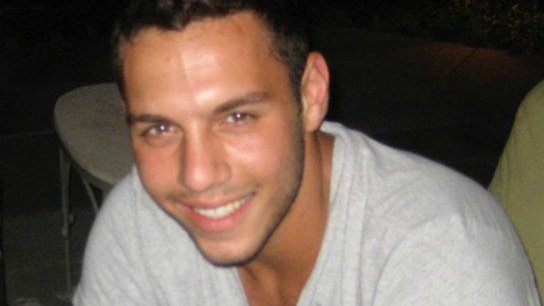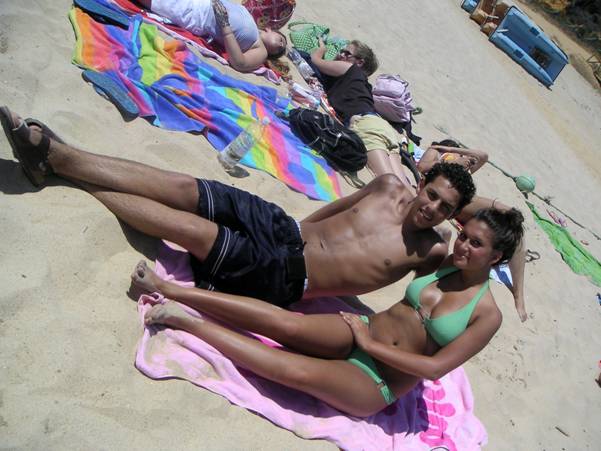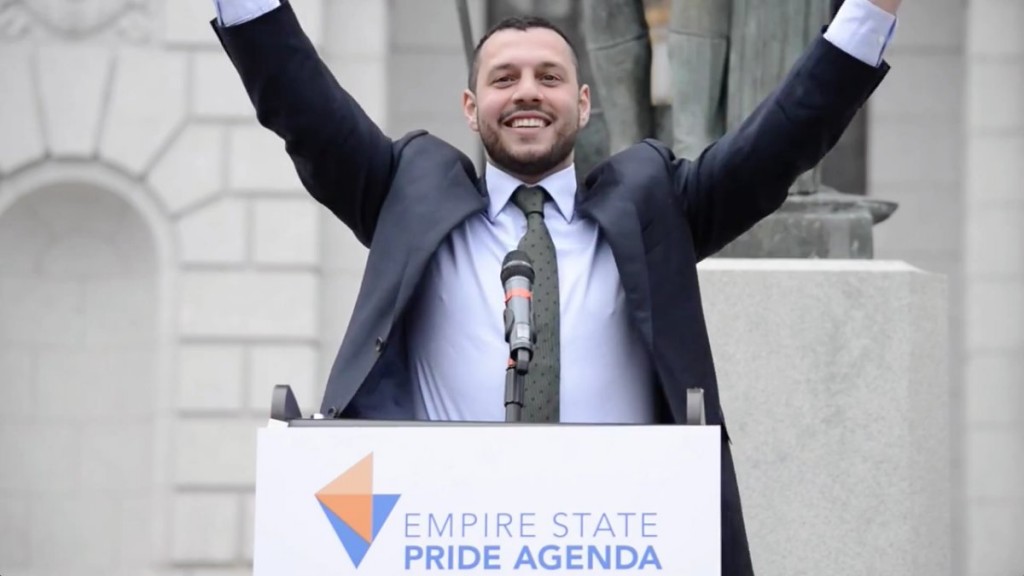‘Gay conversion therapy left me suicidal – now I want to see it banned for good’
By Ben Kelly

There was welcome news last weekend as New York Governor Andrew Cuomo announced regulations to ban conversion therapy against LGBT people, but the sad fact remains that majority of US states have no legislation outlawing the practise. However, one man from New York, Mathew Shurka, has been campaigning for this very thing across the United States, as part of the ‘Born Perfect’ campaign. The 27 year old spoke to Attitude’s Ben Kelly about his experiences across five years of torturous therapy, and the efforts he has been making to ensure no other youth has to endure the same…
“I probably always knew, I just didn’t know it was called ‘being gay’,” Mathew tells me. “My first hookups with boys were as early as 12 in middle school.” It was only when he went to high school that he realized he wasn’t interested in girls at all. “That’s when I started to get worried,” he says. “I was scared that I wasn’t a man, that I had no masculinity.”
“I told my father, and he said, ‘I love you no matter what and I want to be by your side,’ but later that week he panicked, and thought, ‘What does it mean to have a gay son?’ He started looking for therapists and he met one who told him that there was no such thing as homosexuality; that it was all a psychological condition.”
Mathew was raised in a culturally Jewish household, but his conversion therapy was scientific, and not religious – as so many cases across the United States are. His therapists claimed his homosexuality had all been caused by a specific childhood trauma; though needless to say, no one ever uncovered exactly what that was.
Overall, he saw four therapists in five years – most of whom believed they had cured themselves of homosexuality. He was with his main therapist for three of those years; a man from California, who he spoke to over the phone.

“He told me I had an issue with masculinity, and that I was only friends with females. He said I was keeping men as the mysterious object and holding an attraction to them. He wanted to reverse that.” This meant spending more time with other boys, and avoiding women completely; including his own mother, who he didn’t properly speak to for almost three years, despite living in the same house. This made her opposed to the therapy, although his father remained committed to it. “Conversion therapy does tear homes apart, because you ultimately have to blame someone for being gay,” he explains.
Mathew succeeded in fraternizing with more groups of boys, though he inevitably had sexual encounters with some of them. “Every time I hooked up with a boy I would have to tell my conversion therapist, so I tried not to. I had to go through masturbation techniques as a way to heal myself, so I had to watch only heterosexual pornography, and focus on the female imagery. The more I would jerk off to girls, it was a good thing.”
He ended up having an unhealthy relationship with masturbation which worried and panicked him, and as he tells me how his therapist ‘coached’ him through this, it comes across as extremely inappropriate. “It’s totally inappropriate!” he agrees. “I thought he was being so cool, being so open. I thought the therapy was working in the sense that I was making a lot of guy friends, but I was convincing myself that I was bonding with them.”

Things culminated as Mathew became older, and his attraction to men only grew stronger. He continued to sleep with men, and consider that a failing, but he also had to force himself to sleep with women (his therapist even prescribed him Viagra for this). He was suffering anxiety and panic attacks. “I did contemplate suicide for two to three years,” he admits. “All I could think of was that I didn’t know another 18 year old boy that was doing this.”
The final straw came when he struck up a proper relationship with another guy, and confessed it to his therapist, who then conspired with his father to break them up. The other boy was told never to contact Mathew again. “I was devastated, and I didn’t know why it happened until six months later. When I found out, that was the moment I cut that therapist and my father off.” This is where Mathew began to confront what had happened to him, and embrace his true self.
After starting a YouTube channel in 2012, Mathew soon started to pick up attention in the press, and started working with civil rights lawyers and organizations from all over the United States. In January 2013, he spoke at the largest LGBT conference in the country. “That, to me, was crazy, because only five minutes ago I thought I was supposed to be straight, and now here I was – newly out – and sharing my story publicly.”
As he was doing this work, helping others to avoid the difficulties he had endured, Mathew also did some personal healing, and made peace with his father – who he hadn’t spoken to for five years. “It took a lot for me to make peace with him. I see now that he was well intentioned – he really did think he was saving me from something. But he sees now that it went too far.”
He even made peace with his former therapist from California. “He had stopped doing conversion therapy and shared his own story with me,” he says. “I told him I could get him into a lawsuit, but instead I was going to keep his name secret, I was going to forgive him, and I asked for his help in ending this practice. He gave me his blessing, and he cried.” After this, the pair even did a joint interview covering both perspectives of conversion therapy, in the summer of 2013.

In 2014, Mathew started Born Perfect – a campaign movement which aims to have conversion therapy banned across the United States. It is currently illegal to practice on minors in the states of California, New Jersey, Illinois and Oregon, as well as in Washington D.C., and – as of last week – it’s coming to New York as well. But, it remains a problem in a majority of states.
“We have a federal bill, and it’s in Congress,” he explains. If it progresses, and passes, it would set the law in place nationwide. And crucially, where the individual state bills have thus far only covered minors, the congressional bill would effectively rule conversion therapy as consumer fraud – outlawing it entirely. “It would end conversion therapy on people of all ages,” Matthew says, “for anyone who’s willing to take money for it. I think it’s a much better bill.”
Despite the many problems affecting America’s LGBT community, Matthew feels that banning conversion therapy is fundamental, and should be the next frontier for activists. “Sure there’s still a majority of states where you can be legally fired for being gay or being kicked out of your apartment for being gay,” he admits, “but the position I take about conversion therapy is that it takes away the stigma that homosexuality can be cured, that it’s a disease.”
His cause has powerful supporters, particularly in the Democratic Party. Following the death of transgender Leelah Alcorn in 2015, President Obama publicly stated he wanted to end the practice nationally, with the White House saying they were concerned about its “devastating effects.”
Hillary Clinton has put the same measure in her LGBT presidential agenda. Mathew points out that Bernie Sanders has the best LGBT track record of all presidential candidates, though he hasn’t said anything publicly about conversion therapy – “not that I know of. But I would love it if he did.”

Another reason Mathew feels so passionately about raising his voice on this issue is because of how it overwhelmingly affects minors. “It’s children. They don’t have a voice, they don’t have voting rights. The conversion therapists believe the younger you are, the higher the chance that the therapy will work.”
If we can start to look at loving and accepting each other and that everyone is born perfect then we can start to focus on everything else.”
Mathew can, of course, advocate for others now, because he is in a much better place in his own life, and is more comfortable with his sexuality. “I love being a man. I love being attracted to men,” he grins. “I love men, everything about them. I could not be more proud of being a gay man.
“At times I’m still impacted from the therapy, but my work helps me move on; meeting other LGBT people that I can look up to, and my family coming back into my life.”
Has he been in a relationship since the fateful one his therapist broke up all those years ago? “When it comes to dating, it’s still difficult for me. Because I was always surrounded by heterosexual men in the conversion therapy, I would always look for the gay one that I could maybe have something with. I still catch myself doing that sometimes. I had being going for guys that weren’t out yet and on the fence and I found myself stuck in that pattern. So I haven’t been in a committed public relationship with an openly gay man. That’s what I’m looking for.”
Learn more about the Born Perfect campaign on their official website, or by following Mathew on Twitter.
More stories:
Will Young admits gay ‘shame’ has left him addicted to porn and alcohol
Jack Falahee live-tweets upcoming ‘How to Get Away with Murder’ naked scene
